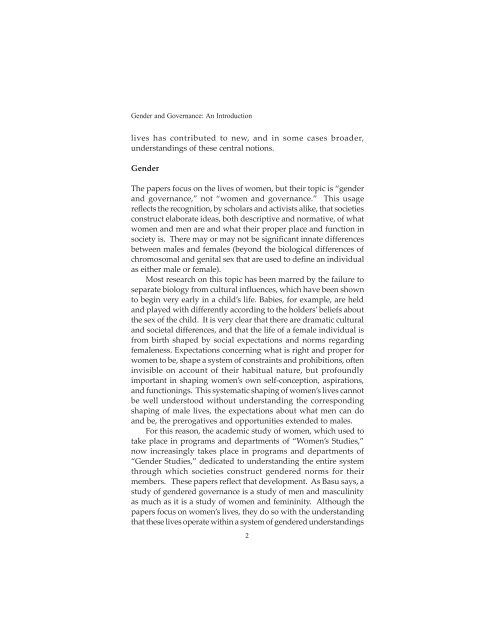Essays On Gender And Governance - United Nations Development ...
Essays On Gender And Governance - United Nations Development ...
Essays On Gender And Governance - United Nations Development ...
You also want an ePaper? Increase the reach of your titles
YUMPU automatically turns print PDFs into web optimized ePapers that Google loves.
<strong>Gender</strong> and <strong>Governance</strong>: An Introduction<br />
lives has contributed to new, and in some cases broader,<br />
understandings of these central notions.<br />
<strong>Gender</strong><br />
The papers focus on the lives of women, but their topic is “gender<br />
and governance,” not “women and governance.” This usage<br />
reflects the recognition, by scholars and activists alike, that societies<br />
construct elaborate ideas, both descriptive and normative, of what<br />
women and men are and what their proper place and function in<br />
society is. There may or may not be significant innate differences<br />
between males and females (beyond the biological differences of<br />
chromosomal and genital sex that are used to define an individual<br />
as either male or female).<br />
Most research on this topic has been marred by the failure to<br />
separate biology from cultural influences, which have been shown<br />
to begin very early in a child’s life. Babies, for example, are held<br />
and played with differently according to the holders’ beliefs about<br />
the sex of the child. It is very clear that there are dramatic cultural<br />
and societal differences, and that the life of a female individual is<br />
from birth shaped by social expectations and norms regarding<br />
femaleness. Expectations concerning what is right and proper for<br />
women to be, shape a system of constraints and prohibitions, often<br />
invisible on account of their habitual nature, but profoundly<br />
important in shaping women’s own self-conception, aspirations,<br />
and functionings. This systematic shaping of women’s lives cannot<br />
be well understood without understanding the corresponding<br />
shaping of male lives, the expectations about what men can do<br />
and be, the prerogatives and opportunities extended to males.<br />
For this reason, the academic study of women, which used to<br />
take place in programs and departments of “Women’s Studies,”<br />
now increasingly takes place in programs and departments of<br />
“<strong>Gender</strong> Studies,” dedicated to understanding the entire system<br />
through which societies construct gendered norms for their<br />
members. These papers reflect that development. As Basu says, a<br />
study of gendered governance is a study of men and masculinity<br />
as much as it is a study of women and femininity. Although the<br />
papers focus on women’s lives, they do so with the understanding<br />
that these lives operate within a system of gendered understandings<br />
2

















